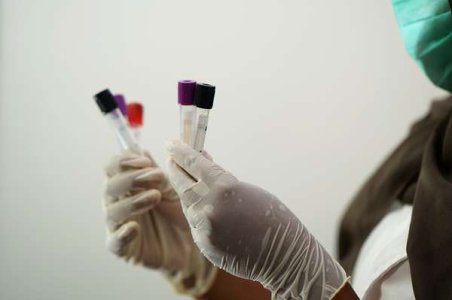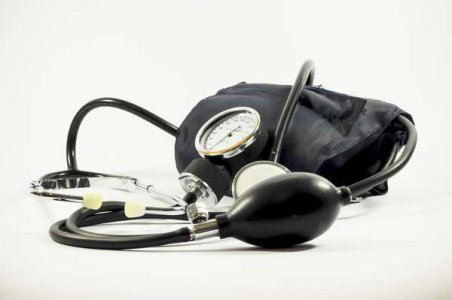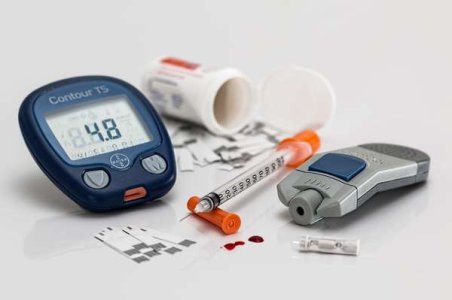Unlock the secrets of your health with these 6 essential blood tests – are you missing out?
- Replies 0
As we gracefully navigate the golden years, staying on top of our health becomes more crucial than ever. With the myriad of medical advice and health tips swirling around, it's easy to feel overwhelmed.
So, let’s cut through the noise and highlight the six essential blood tests that can unlock the secrets of your health. Whether you're feeling fit as a fiddle or have noticed some changes in your well-being, these tests are the keys to a comprehensive health check-up.
If you haven’t had your blood checked in years, it’s probably time to consult with your doctor about getting it done. It can tell you a lot about your state of health.
Meanwhile, how often you should get blood work done and the type of tests you need is based on your age and personal health.
The Centers for Disease Control say that most healthy adults only need to have their cholesterol checked every four to six years. Meanwhile, the A1C should be tested at the age of 45 and then every one to two years if you are pre-diabetic or have risk factors for prediabetes and type 2 diabetes.
On the other hand, tests like hepatitis B are only recommended once in your life for adults aged 18 or older unless you have symptoms or are pregnant.

With all these different types of blood tests available, it can be overwhelming to know what to get and when to get it. So, here’s a guide based on the advice of two doctors:
1. Complete Blood Count (CBC)
The CBC is the grandmaster of blood tests, offering a panoramic view of your blood's health. It's like a census of your blood cells, tallying up red and white blood cells, along with platelets.
This test is a must for everyone, regardless of age, and can reveal a plethora of conditions, from anemia and infections to more serious issues like leukemia or immune system disorders.
Dr. Soma Mandal, a board-certified internist from Summit Health in New Jersey says that a CBC test is "recommended for individuals of all ages as part of a routine health examination, or when symptoms suggest a potential health issue."
Meanwhile, Dr. Maria Knöbel, Medical Cert UK medical director, comments that CBC is ideal for anyone having a routine health check-up. She also advises you to get one if you are "experiencing symptoms like persistent fatigue, unexplained bruising or frequent infections."
Typically accepted ranges for adults are:
- Red blood cells: 4.5-5.9 million cells/microliter (men), 4.1-5.1 million cells/microliter (women)
- White blood cells: 4,500-11,000 cells/microliter
- Hemoglobin: 13.8-17.2 grams/deciliter (men), 12.1-15.1 grams/deciliter (women)
- Platelets: 150,000-450,000 platelets/microliter
- Hematocrit: 40.7%-50.3% (men), 36.1%-44.3% (women)

2. Lipid Panel
Cholesterol isn't all bad, but when the scales tip towards too much LDL (the “bad” cholesterol), your heart could be damaged. Lipids are the fats and fatty substances found in your blood.
The lipid panel is your guide for cardiovascular health, measuring not just total cholesterol but also the good (HDL) and the bad (LDL), along with triglycerides.
Mandal says that this test is helpful for anyone "at risk of cardiovascular diseases, including those with a family history of heart disease, smokers, people with hypertension or those who are overweight."
Meanwhile, Knöbel says that a lipid panel measures total cholesterol and identifies it as either HDL or LDL and triglycerides.
She stated that "Elevated LDL levels are associated with an increased risk of heart disease, while high HDL levels are generally protective. Elevated triglycerides can also indicate a risk for heart disease and may be associated with other conditions like diabetes."
The normal parameters for adults are:
- Total cholesterol: Less than 200 mg/dL
- LDL cholesterol: Less than 100 mg/dL
- HDL cholesterol: 40 mg/dL or higher (men), 50 mg/dL or higher (women)
- Triglycerides: Less than 150 mg/dL
Also read: Shocking discovery: one man's extreme diet reveals the dangers of high cholesterol buildup
3. Basic Metabolic Panel (BMP)
The BMP tracks critical elements of your body’s chemistry like glucose, calcium, and electrolytes. Knöbel also states that this includes glucose, calcium, and electrolytes like sodium, potassium, and bicarbonate.
The test also checks kidney function indicators like blood urea nitrogen and creatinine. Knöbel says that "Glucose levels provide insight into blood sugar control. Electrolyte imbalances can reveal issues related to dehydration, kidney disease or metabolic imbalances. Abnormal calcium levels can indicate issues with bone health or parathyroid function."

BMP is often recommended for patients that have diabetes or kidney disease or those at risk. Its results could indicate the two aforementioned diseases, as well as dehydration, hypertension, and deteriorating bone health.
Normal ranges for adults include:
- Glucose: 70-99 mg/dL (fasting)
- Calcium: 8.5-10.2 mg/dL
- Electrolytes (sodium, potassium, bicarbonate, chloride)
- Blood urea nitrogen (BUN): 7-20 mg/dL
- Creatinine: 0.6-1.3 mg/dL
4. Hemoglobin A1C
The Hemoglobin A1C or HbA1c test chronicles your average blood sugar levels over the past two to three months. Mandel shares that it’s usually used to diagnose and monitor diabetes and pre-diabetes.
If you’re overweight, have symptoms of diabetes, have a family history of diabetes, or are over 45 years old, the doctors recommend you get this test. This is a long-term perspective of how well your body handles glucose.
Normal ranges are:
- Normal: Less than 5.7%
- Pre-diabetes: 5.7% to 6.4%
- Diabetes: 6.5% or higher
5. Thyroid Function Tests
Symptoms like fatigue, weight changes, irregular heartbeat, hair loss, or mood swings might prompt this test, which is often included in routine screenings, especially for women over 60, as per Mandal.
This test checks the amount of thyroid-stimulating hormone in your blood. Doctors use the results to check how your thyroid is functioning.
Source: Medicine Made Simple / Youtube.
Your blood test might show:
- High TSH levels/hypothyroidism (an underactive thyroid)
- Low TSH levels/hyperthyroidism (an overactive thyroid)
- Abnormal levels of T3 and T4 (other thyroid disorders)
Typically accepted normal ranges:
- TSH levels: 0.4-4.0 mlU/L
- Free T4 levels: 0.8-1.8 ng/dL
- Free T3 levels: 2.3-4.3 pg/mL
6. 25-hydroxy vitamin D
Mount Sinai, a hospital system in New York, shares that older patients may benefit from a 25-hydroxy test to check their vitamin D levels.
The 25-hydroxy vitamin D test helps people who are over the age of 65, have osteoporosis, get limited sun exposure, and/or have Crohn’s disease, celiac disease, or ulcerative colitis.
While there's some debate over the optimal range, a generally accepted healthy range is between 20 and 40 ng/mL.
Before you rush to the lab, have a conversation with your doctor. Discuss your health history, lifestyle, and any concerns you may have.
Your doctor will help determine which tests are right for you and how often you should have them. Remember, while some tests are beneficial for routine check-ups, others may be more situational.
If your results come back with abnormalities, don't panic. Your doctor will guide you through the next steps, which may include additional screenings or lifestyle changes.
And if your results are normal? That's great news! But it doesn't mean you're off the hook. Continue to monitor your health and repeat these tests as recommended.
Also read: Discover the life-saving blood test that could detect colorectal cancer early!

Have you had any of these tests recently? Were there any surprises in your results? Or perhaps you have a tip for making blood tests less daunting? Share your experiences and advice in the comments below!
So, let’s cut through the noise and highlight the six essential blood tests that can unlock the secrets of your health. Whether you're feeling fit as a fiddle or have noticed some changes in your well-being, these tests are the keys to a comprehensive health check-up.
If you haven’t had your blood checked in years, it’s probably time to consult with your doctor about getting it done. It can tell you a lot about your state of health.
Meanwhile, how often you should get blood work done and the type of tests you need is based on your age and personal health.
The Centers for Disease Control say that most healthy adults only need to have their cholesterol checked every four to six years. Meanwhile, the A1C should be tested at the age of 45 and then every one to two years if you are pre-diabetic or have risk factors for prediabetes and type 2 diabetes.
On the other hand, tests like hepatitis B are only recommended once in your life for adults aged 18 or older unless you have symptoms or are pregnant.

Blood tests can reveal significant insights into your overall health, such as kidney function, cholesterol levels, and more. Image source: Shameer Pk / Pixabay.
With all these different types of blood tests available, it can be overwhelming to know what to get and when to get it. So, here’s a guide based on the advice of two doctors:
1. Complete Blood Count (CBC)
The CBC is the grandmaster of blood tests, offering a panoramic view of your blood's health. It's like a census of your blood cells, tallying up red and white blood cells, along with platelets.
This test is a must for everyone, regardless of age, and can reveal a plethora of conditions, from anemia and infections to more serious issues like leukemia or immune system disorders.
Dr. Soma Mandal, a board-certified internist from Summit Health in New Jersey says that a CBC test is "recommended for individuals of all ages as part of a routine health examination, or when symptoms suggest a potential health issue."
Meanwhile, Dr. Maria Knöbel, Medical Cert UK medical director, comments that CBC is ideal for anyone having a routine health check-up. She also advises you to get one if you are "experiencing symptoms like persistent fatigue, unexplained bruising or frequent infections."
Typically accepted ranges for adults are:
- Red blood cells: 4.5-5.9 million cells/microliter (men), 4.1-5.1 million cells/microliter (women)
- White blood cells: 4,500-11,000 cells/microliter
- Hemoglobin: 13.8-17.2 grams/deciliter (men), 12.1-15.1 grams/deciliter (women)
- Platelets: 150,000-450,000 platelets/microliter
- Hematocrit: 40.7%-50.3% (men), 36.1%-44.3% (women)

A range of important blood tests includes the Complete Blood Count (CBC), Lipid Panel, Basic Metabolic Panel (BMP), Hemoglobin A1C, Thyroid Function Tests, and Vitamin D Levels. Image source: Ewa Urban / Pixabay.
2. Lipid Panel
Cholesterol isn't all bad, but when the scales tip towards too much LDL (the “bad” cholesterol), your heart could be damaged. Lipids are the fats and fatty substances found in your blood.
The lipid panel is your guide for cardiovascular health, measuring not just total cholesterol but also the good (HDL) and the bad (LDL), along with triglycerides.
Mandal says that this test is helpful for anyone "at risk of cardiovascular diseases, including those with a family history of heart disease, smokers, people with hypertension or those who are overweight."
Meanwhile, Knöbel says that a lipid panel measures total cholesterol and identifies it as either HDL or LDL and triglycerides.
She stated that "Elevated LDL levels are associated with an increased risk of heart disease, while high HDL levels are generally protective. Elevated triglycerides can also indicate a risk for heart disease and may be associated with other conditions like diabetes."
The normal parameters for adults are:
- Total cholesterol: Less than 200 mg/dL
- LDL cholesterol: Less than 100 mg/dL
- HDL cholesterol: 40 mg/dL or higher (men), 50 mg/dL or higher (women)
- Triglycerides: Less than 150 mg/dL
Also read: Shocking discovery: one man's extreme diet reveals the dangers of high cholesterol buildup
3. Basic Metabolic Panel (BMP)
The BMP tracks critical elements of your body’s chemistry like glucose, calcium, and electrolytes. Knöbel also states that this includes glucose, calcium, and electrolytes like sodium, potassium, and bicarbonate.
The test also checks kidney function indicators like blood urea nitrogen and creatinine. Knöbel says that "Glucose levels provide insight into blood sugar control. Electrolyte imbalances can reveal issues related to dehydration, kidney disease or metabolic imbalances. Abnormal calcium levels can indicate issues with bone health or parathyroid function."

Each blood test serves a specific purpose, from measuring blood components to assessing long-term blood sugar control and thyroid function. Image source: Steve Buissinne / Pixabay.
BMP is often recommended for patients that have diabetes or kidney disease or those at risk. Its results could indicate the two aforementioned diseases, as well as dehydration, hypertension, and deteriorating bone health.
Normal ranges for adults include:
- Glucose: 70-99 mg/dL (fasting)
- Calcium: 8.5-10.2 mg/dL
- Electrolytes (sodium, potassium, bicarbonate, chloride)
- Blood urea nitrogen (BUN): 7-20 mg/dL
- Creatinine: 0.6-1.3 mg/dL
4. Hemoglobin A1C
The Hemoglobin A1C or HbA1c test chronicles your average blood sugar levels over the past two to three months. Mandel shares that it’s usually used to diagnose and monitor diabetes and pre-diabetes.
If you’re overweight, have symptoms of diabetes, have a family history of diabetes, or are over 45 years old, the doctors recommend you get this test. This is a long-term perspective of how well your body handles glucose.
Normal ranges are:
- Normal: Less than 5.7%
- Pre-diabetes: 5.7% to 6.4%
- Diabetes: 6.5% or higher
5. Thyroid Function Tests
Symptoms like fatigue, weight changes, irregular heartbeat, hair loss, or mood swings might prompt this test, which is often included in routine screenings, especially for women over 60, as per Mandal.
This test checks the amount of thyroid-stimulating hormone in your blood. Doctors use the results to check how your thyroid is functioning.
Source: Medicine Made Simple / Youtube.
Your blood test might show:
- High TSH levels/hypothyroidism (an underactive thyroid)
- Low TSH levels/hyperthyroidism (an overactive thyroid)
- Abnormal levels of T3 and T4 (other thyroid disorders)
Typically accepted normal ranges:
- TSH levels: 0.4-4.0 mlU/L
- Free T4 levels: 0.8-1.8 ng/dL
- Free T3 levels: 2.3-4.3 pg/mL
6. 25-hydroxy vitamin D
Mount Sinai, a hospital system in New York, shares that older patients may benefit from a 25-hydroxy test to check their vitamin D levels.
The 25-hydroxy vitamin D test helps people who are over the age of 65, have osteoporosis, get limited sun exposure, and/or have Crohn’s disease, celiac disease, or ulcerative colitis.
While there's some debate over the optimal range, a generally accepted healthy range is between 20 and 40 ng/mL.
Before you rush to the lab, have a conversation with your doctor. Discuss your health history, lifestyle, and any concerns you may have.
Your doctor will help determine which tests are right for you and how often you should have them. Remember, while some tests are beneficial for routine check-ups, others may be more situational.
If your results come back with abnormalities, don't panic. Your doctor will guide you through the next steps, which may include additional screenings or lifestyle changes.
And if your results are normal? That's great news! But it doesn't mean you're off the hook. Continue to monitor your health and repeat these tests as recommended.
Also read: Discover the life-saving blood test that could detect colorectal cancer early!
Key Takeaways
- Blood tests can reveal significant insights into your overall health, such as kidney function, cholesterol levels, and more.
- A range of important blood tests includes the Complete Blood Count (CBC), Lipid Panel, Basic Metabolic Panel (BMP), Hemoglobin A1C, Thyroid Function Tests, and Vitamin D Levels.
- Each blood test serves a specific purpose, from measuring blood components to assessing long-term blood sugar control and thyroid function.
- It's important to consult with your doctor about which blood tests are appropriate for you, based on your personal health profile and any symptoms you may be experiencing.
Have you had any of these tests recently? Were there any surprises in your results? Or perhaps you have a tip for making blood tests less daunting? Share your experiences and advice in the comments below!






